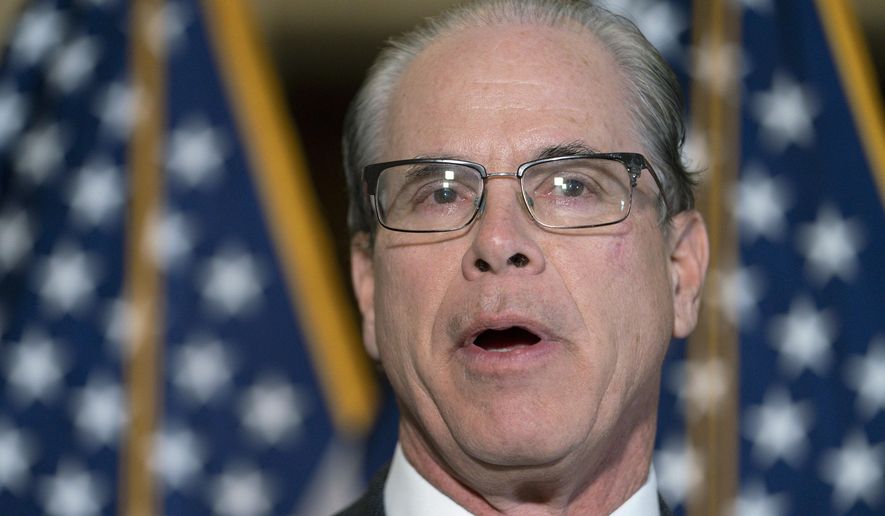INDIANAPOLIS — Republican U.S. Sen. Mike Braun formally launched a committee Wednesday for a 2024 campaign for governor in his home state of Indiana, a move that would forego a reelection bid for his Senate seat.
Braun, the 68-year-old wealthy founder of a national auto parts distribution business, is the most prominent of several active potential Republican candidates for the field to replace GOP Gov. Eric Holcomb, who can’t seek reelection because of term limits.
Braun would be heavily favored to win a second Senate term in 2024 from Republican-dominated Indiana after fueling his successful 2018 Senate campaign with more than $11 million in personal loans to go from being a little-known businessman to unseating Democratic Sen. Joe Donnelly.
Josh Kelley, Braun’s chief of staff and senior political adviser, acknowledged the campaign filing with the Indiana Election Division and said in an email that Braun “will be making an official announcement of his candidacy very soon.”
Braun campaigned in 2018 as a strong supporter of then-President Donald Trump and has often aligned himself closely with U.S. Senate Republicans’ most conservative members while bemoaning the Senate’s deliberative pace. He supported the failed attempt by Florida Sen. Rick Scott this month to unseat Senate Republican leader Mitch McConnell, saying in a statement that “Hoosier conservative Republicans are sick and tired of the status quo.”
Braun had announced he would vote against accepting Electoral College votes from some states Democrat Joe Biden won in the 2020 election over Trump. But he changed his mind after the Jan. 6, 2021, insurrection at the U.S. Capitol, saying the violence “changed things drastically” and that he would “vote to get this ugly day behind us.”
He has split recently with fellow Indiana Republicans, publicly denouncing Holcomb’s decision in March to veto a GOP-backed bill banning transgender girls from competing in Indiana girls sports teams.
Braun also split from Indiana GOP Sen. Todd Young, who won reelection in November, by voting Tuesday against a bill protecting same-sex and interracial marriages across the country. Braun earlier this year told reporters that the U.S. Supreme Court was wrong with its 1967 decision legalizing interracial marriage nationwide, while later saying he misunderstood the question.
State Democratic Chairman Mike Schmuhl faulted Braun for his vote on the marriage bill and his opposition to Biden’s COVID-19 economic recovery programs.
“Mike Braun has done very little to improve Indiana as a U.S. senator and he surely won’t do it as governor,” Schmuhl said in a statement. “Braun’s half-hearted efforts have been ineffective, and he’s been more likely to be spotted on national cable TV shows than talking to Hoosiers in real life about solving real problems.”
Indiana’s open governor’s seat has many possible candidates.
Lt. Gov. Suzanne Crouch, who was Holcomb’s 2016 and 2020 running mate, has raised more than $2 million for an unannounced campaign, and Fort Wayne businessman Eric Doden has raised a similar amount since he kicked off a campaign last year.
Republican U.S. Rep. Trey Hollingsworth alluded to a possible run for other political offices when he announced in January that he wouldn’t seek reelection - and some Republicans are hoping that former Gov. Mitch Daniels will seek a Statehouse return after he steps down as Purdue University’s president at the end of December.
Braun said two weeks ago that he wouldn’t be discouraged by the possible Republican field for governor and that he wouldn’t spend his own money again on a 2024 campaign.
Two Republicans with reported interest in running for the Senate seat if Braun doesn’t seek reelection are U.S. Rep. Jim Banks, who unsuccessfully sought a top House Republican position earlier this month, and U.S. Rep. Victoria Spartz.
Discussions of possible 2024 statewide Democratic candidates have centered on Donnelly, who is now President Joe Biden’s ambassador to the Vatican, and former state schools superintendent Jennifer McCormick, who won election as a Republican in 2016 but has since switched parties after disputes with Republican Statehouse leaders over education policies.




Please read our comment policy before commenting.